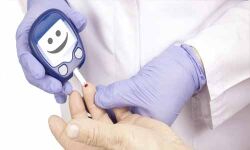- Home
- Medical news & Guidelines
- Anesthesiology
- Cardiology and CTVS
- Critical Care
- Dentistry
- Dermatology
- Diabetes and Endocrinology
- ENT
- Gastroenterology
- Medicine
- Nephrology
- Neurology
- Obstretics-Gynaecology
- Oncology
- Ophthalmology
- Orthopaedics
- Pediatrics-Neonatology
- Psychiatry
- Pulmonology
- Radiology
- Surgery
- Urology
- Laboratory Medicine
- Diet
- Nursing
- Paramedical
- Physiotherapy
- Health news
- Fact Check
- Bone Health Fact Check
- Brain Health Fact Check
- Cancer Related Fact Check
- Child Care Fact Check
- Dental and oral health fact check
- Diabetes and metabolic health fact check
- Diet and Nutrition Fact Check
- Eye and ENT Care Fact Check
- Fitness fact check
- Gut health fact check
- Heart health fact check
- Kidney health fact check
- Medical education fact check
- Men's health fact check
- Respiratory fact check
- Skin and hair care fact check
- Vaccine and Immunization fact check
- Women's health fact check
- AYUSH
- State News
- Andaman and Nicobar Islands
- Andhra Pradesh
- Arunachal Pradesh
- Assam
- Bihar
- Chandigarh
- Chattisgarh
- Dadra and Nagar Haveli
- Daman and Diu
- Delhi
- Goa
- Gujarat
- Haryana
- Himachal Pradesh
- Jammu & Kashmir
- Jharkhand
- Karnataka
- Kerala
- Ladakh
- Lakshadweep
- Madhya Pradesh
- Maharashtra
- Manipur
- Meghalaya
- Mizoram
- Nagaland
- Odisha
- Puducherry
- Punjab
- Rajasthan
- Sikkim
- Tamil Nadu
- Telangana
- Tripura
- Uttar Pradesh
- Uttrakhand
- West Bengal
- Medical Education
- Industry
Big blood sugar swings in diabetes patients may increase heart disease risk

BATON ROUGE, LOUISIANA -Researchers at Pennington Biomedical Research Center, Louisianahave found in a new study that in patients with type 2 diabetes, big swings in blood sugar levels between doctors' visits are associated with an increased risk of heart disease.Large visit‐to‐visit HbA1c variability is associated with an increased risk of cardiovascular disease in patients with type 2 diabetes. Severe hypoglycaemia may mediate the association between HbA1c variability and incident cardiovascular disease.
The study has been published in the journal Diabetes, Obesity & Metabolism.
The study looked at more than 29,000 patients with type 2 diabetes over a two-year period. Patients who already had heart disease were excluded.
The American Diabetes Association recommends adults with diabetes maintain an A1c, the average blood sugar level over the past two to three months, of less than 7 percent to reduce complications from diabetes, such as heart disease. However, studies - including this one -- have shown that wide swings in blood sugar levels may be a better predictor of diabetic complications than the A1c reading at any single doctor's office visit.
"The underlying mechanism for the relationship between wide variations in blood sugar levels between doctor's appointments and high risk of heart disease in patients with type 2 diabetes is unclear," said Gang Hu, MD, PhD, Associate Professor and Director, Chronic Disease Epidemiology Lab at Pennington Biomedical Research Center. "It's possible that episodes of severely low blood sugar may be the connection."
Research has shown that wide variations in blood sugar levels are associated with poor health outcomes and even death. A 2017 Johns Hopkins study found that one-third of people with diabetes hospitalized for a severe low blood sugar episode died within three years of the incident.
"We recommend that patients and their doctors implement therapies that can reduce wide swings in blood sugar levels and the associated episodes of severe low blood sugar," Dr. Hu said. "Our findings suggest that measuring the swings in blood hemoglobin A1c levels over a specific time - six months to a year, for example - could serve as a supplemental blood sugar target," he added.
For further reference log on to:
Dr Kamal Kant Kohli-MBBS, DTCD- a chest specialist with more than 30 years of practice and a flair for writing clinical articles, Dr Kamal Kant Kohli joined Medical Dialogues as a Chief Editor of Medical News. Besides writing articles, as an editor, he proofreads and verifies all the medical content published on Medical Dialogues including those coming from journals, studies,medical conferences,guidelines etc. Email: drkohli@medicaldialogues.in. Contact no. 011-43720751


